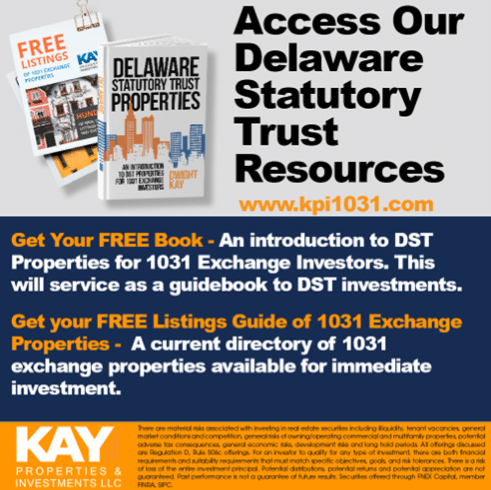Interested in learning more about Delaware Statutory Trust 1031 investments? Make sure to do a thorough job of researching Delaware Statutory Trusts prior to investing in a DST real estate offering, including reviewing client reviews and testimonials, reading published materials, and understanding potential complaints investors may have with Delaware Statutory Trust investments. Please note that testimonials may not be representative of the experience of other clients. Past performance does not guarantee or indicate the likelihood of future results as well as that clients were not compensated for their testimonials. Please speak with your attorney and CPA before considering an investment.
What is a Delaware Statutory Trust?
A good place to start any research on Delaware Statutory Trusts is to understand the definition of exactly what is a Delaware Statutory Trust, and how investors can benefit from it. According to Dwight Kay, founder and CEO of Kay Properties and Investments, and author of what is considered by many to be the first book written on Delaware Statutory Trust investments, a Delaware Statutory Trust is a real estate ownership structure for 1031 exchanges that allows multiple investors to each hold an undivided beneficial interest in the trust. The term “beneficial interest” means that investors hold a percentage of the ownership, and no single owner can claim exclusive ownership over any specific aspect of the real estate.
The fundamental structure of a Delaware Statutory Trust provides investors with several potential benefits including (but not limited to):
- Eliminating the day-to-day headaches of “tenants, toilets, and trash”
- Using Delaware Statutory Trust as part of a 1031 Exchange for Tax Deferral Purposes
- Potential diversification by geography and property type* (Please note that diversification does not guarantee profit or protection from losses)
- Access to multiple real estate asset classes such as Multifamily, Industrial, Self-Storage and Medical properties
Read Reviews from Actual Delaware Statutory Trust Investors
Another good strategy for potential Delaware Statutory Trust investors, in addition to reading potential complaints, is to read published reviews written by actual DST investors. By carefully reading testimonials and reviews, potential investors can read for themselves what real-life investors have experienced. It is however also important to note that past performance does not guarantee future results. Unfortunately, some investors rely instead upon the advice of financial planners and financial advisors when considering investing in a Delaware Statutory Trust. The problem with this type of advice is that these sources can provide investors incorrect or incomplete information relating to DSTs due to the financial advisor and financial planner being a generalist - selling stocks, bonds, mutual funds, insurance and occasionally once or twice a year helping a client with a DST. Because Delaware Statutory Trusts are sophisticated investment vehicles investors should recognize that they require a very specific niche expertise. Investors should also carefully read each offerings Private Placement Memorandum (PPM) which will go into the business plan and risk factors of each 1031 DST investment.
Kay Properties has an entire team of Delaware Statutory Trust experts that have been involved with more DST exchanges in a single year than most financial planners and advisors have done in an entire career.
As a result, Kay Properties has clients all over the country who have written kind letters of thanks and testimonials of how Kay Properties helped them with their personal 1031 exchange and Delaware Statutory Trust investments. It might be enlightening for potential investors to review some of these testimonials Kay Properties has received from actual investors. Please note that testimonials may not be representative of the experience of other clients. Past performance does not guarantee or indicate the likelihood of future results as well as that clients were not compensated for their testimonials. Please speak with your attorney and CPA before considering an investment.
Access Additional Resources for Delaware Statutory Trust and 1031 Investors
In addition to reading Delaware Statutory Trust reviews and researching complaints, another good strategy for investors wanting to learn more about Delaware Statutory Trust investments is to study published materials produced by DST experts. For example, many have stated that no one in the country does more to educate potential DST investors than Kay Properties and Investments. With a comprehensive platform of educational options, Kay Properties is considered by many nationwide to be the preeminent authority and expert in DST 1031 exchanges and investment strategies.
For example, we have a number of DST 1031 resources and educational materials that are available at www.kpi1031.com, including:
- A free book on 1031 DST Properties that is believed to be the first book ever published on Delaware Statutory Trusts.
- A free subscription to the 1031 DST Digest magazine that goes into case studies, overviews on 1031 exchanges, Delaware Statutory Trust strategies, different asset classes, geographic locations and more.
- Educational 1031 weekly conference calls that highlight timely topics on 1031 exchanges, Delaware Statutory Trusts, and what you as an investor need to know about how they work, the potential pros and cons of investing in DSTs, and the potential risks as well.
Most Common Complaints Relating to Delaware Statutory Trusts
Finally, investors interested in Delaware Statutory Trust investment strategies should also recognize that some investors might have complaints about DST investments. Below are some of the most common complaints investors might have regarding Delaware Statutory Trusts, and some of the most common responses to these complaints.
Complaint #1: Lack of control
One of the distinct aspects of the Delaware Statutory Trust is that it is structured to be a 100% passive investment. This means that investors have a hands-off role in the day-to-day management and decision-making processes associated with DST investments. This can be difficult for some investors who have spent 10, 20, or even 30 years actively managing their own rental real estate.
However, most Delaware Statutory Trust investments have a professional management team in place who are experienced in handling the day-to-day aspects of the DST property regardless of the asset class. It is also worth noting that while investors may play a passive role without having to be involved with day-to-day operations, top Delaware Statutory Trust sponsor companies typically provide regular financial and operational updates to investors, providing potential transparency and visibility into the performance of the DST investment.
Complaint #2: Lack of Liquidity
One of the most common complaints of Delaware Statutory Trust investments are usually centered around the issue of liquidity.
First off, it is important to note that DST 1031 properties are real estate, and like all other types of real estate, they are inherently illiquid. Unlike stocks listed on a public exchange, DSTs cannot be liquidated by logging into an online stock brokerage account and a click of a button. Investors should be able and willing to hold their investment in a DST 1031 property for the full life of the offering, which could last for 7-10 years or even longer. Our founder, Dwight Kay, first started investing in DST properties in 2008 and owns over 50 different DST investments personally. He has seen DSTs sell in as little as a year and others go as long as 12+ years. Investors need to understand that DSTs are illiquid and are a long-term, buy and hold type of investment.
Complaint #3: Poor Performance for the Delaware Statutory Trust Investment
Just like any investment, there is no guarantee of monthly distribution, return or appreciation. Because DST properties are real estate investments, investors should understand that DST offerings have no guarantee for rental income as well as no guarantee for appreciation. Furthermore, anytime anyone invests in real estate, there are always material risks involved. Some of these risks include unforeseen vacancies, general market conditions, interest rate risks, general risks of owning/operating commercial and multifamily properties, financing risks, and general economic risks. Kay Properties has participated in over $30 billion dollars of DST investments from over 25 different Delaware Statutory Trust sponsor companies. Our founder has been personally invested in the DSTs of many of the major DST sponsors. This gives us unique insight into which of the DST sponsor companies have historically performed well for investors and which have not as well as which have offered the proverbial DST investor horror story experience. It also gives Kay Properties unique insight as to which types of DST investments have historically done well and which have not. For instance, certain DST asset classes like hotels and senior living are considered very high risk and as a result, Kay Properties will not offer any of these to investors due to the heightened level of risk.
Delaware Statutory Trust investments continue to attract investors who are considering a 1031 exchange or even direct cash investment. However, before moving forward and investing in any Delaware Statutory Trust offering, investors should consider researching investor DST reviews, published materials, and complaints. If you would like a list of DST investor reviews please visit www.kpi1031.com to register. We will also give you a free book on how to understand if DST investments are right for your particular situation. As always, please be aware that testimonials may not reflect the experiences of all clients. Previous performance does not assure or imply the probability of future outcomes, and it should also be noted that clients did not receive compensation for their testimonials. Before contemplating any investment, we strongly advise you to consult with your attorney and CPA.


